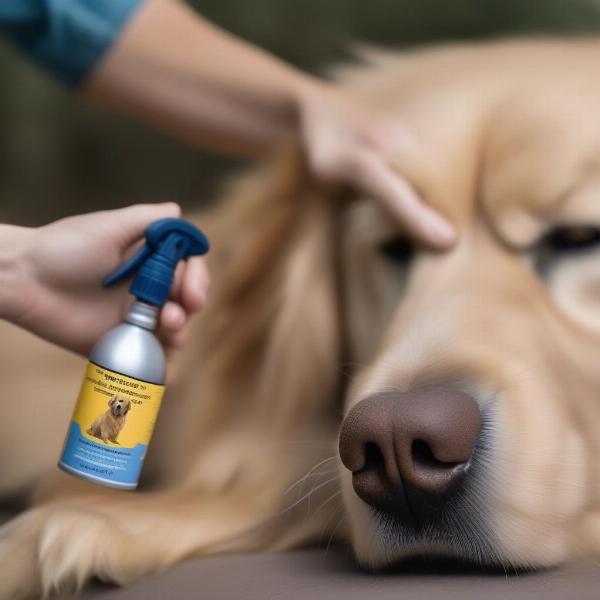Protecting your furry friend from ticks is crucial for their health and well-being. Ticks are not just annoying pests; they can transmit serious diseases like Lyme disease, ehrlichiosis, and anaplasmosis. Finding the right dog spray for ticks can be overwhelming with so many options available. This article will guide you through choosing the most effective and safe tick spray for your dog, considering various factors like ingredients, application methods, and your dog’s specific needs.
Types of Tick Sprays for Dogs
Understanding the different types of tick sprays available helps you make an informed decision. Generally, tick sprays fall into two main categories: chemical and natural.
Chemical Tick Sprays
These sprays typically contain synthetic insecticides like permethrin, fipronil, or imidacloprid. They are highly effective at killing ticks but can pose risks if not used correctly. Always follow the manufacturer’s instructions carefully. Some chemical sprays are not suitable for puppies or pregnant/nursing dogs.
Natural Tick Sprays
Natural sprays utilize essential oils and other plant-based ingredients like citronella, lemongrass, and peppermint oil to repel ticks. While generally safer than chemical options, they may not be as potent and require more frequent applications.
 Natural Tick Spray for Dogs
Natural Tick Spray for Dogs
Choosing the Right Tick Spray for Your Dog
Several factors influence which tick spray is best for your dog.
Your Dog’s Age and Health
Puppies and senior dogs may have more sensitive skin and require gentler formulas. If your dog has any underlying health conditions, consult your veterinarian before using any tick spray.
Your Dog’s Lifestyle
How active is your dog? Does he swim frequently? These factors can impact how long a spray remains effective. For swimming dogs, look for water-resistant formulas.
The Environment
If you live in a tick-infested area, you may need a stronger, more frequent application. Consider the local climate and vegetation when choosing a spray.
How to Apply Tick Spray Safely and Effectively
Always follow the product instructions meticulously. Apply the spray evenly over your dog’s entire coat, avoiding the eyes, nose, and mouth. Be sure to cover areas where ticks commonly attach, like the ears, neck, and groin.
Are Tick Sprays Safe for Dogs?
Both chemical and natural sprays can be safe when used correctly. However, some dogs may be sensitive to certain ingredients. Always monitor your dog for any adverse reactions after application, such as skin irritation, excessive scratching, or vomiting.
Potential Side Effects of Chemical Sprays
While rare, chemical sprays can cause neurological problems if ingested or over-applied. Always store them safely out of your dog’s reach.
Potential Side Effects of Natural Sprays
Some essential oils can be toxic to dogs if ingested. Ensure the spray you choose is specifically formulated for dogs and use it as directed.
What if My Dog Licks the Tick Spray?
If your dog licks the tick spray, contact your veterinarian immediately. While most sprays are formulated to minimize toxicity, ingestion can still cause gastrointestinal upset or other problems.
Conclusion
Choosing the right dog spray for ticks involves carefully considering your dog’s individual needs, lifestyle, and the environment. By understanding the different types of sprays available and following safe application practices, you can provide your furry companion with effective protection against these pesky parasites. Remember to consult your veterinarian if you have any concerns or questions about using tick sprays on your dog.
FAQ
- How often should I apply tick spray to my dog? The frequency of application depends on the specific product and your dog’s lifestyle. Most sprays require reapplication every few weeks or after swimming.
- Can I use human tick spray on my dog? Never use human tick spray on your dog. These products often contain ingredients that are toxic to dogs.
- What should I do if I find a tick on my dog after applying spray? Carefully remove the tick using tweezers, ensuring you grasp it close to the skin. Dispose of the tick properly and monitor the bite area for any signs of infection.
- Are there any alternatives to tick sprays? Yes, alternatives include tick collars, oral medications, and topical treatments. Discuss these options with your veterinarian to determine the best approach for your dog.
- Can I use tick spray with other flea and tick preventatives? Consult your veterinarian before combining different flea and tick products, as some combinations can be harmful.
- What is the best tick spray for puppies? Puppies require gentler formulas. Consult your veterinarian for recommendations on safe and effective tick sprays for puppies.
- Where can I buy dog tick spray? Tick sprays are available at pet stores, veterinary clinics, and online retailers.
Related Articles on ILM Dog
- natural spray for fleas and ticks on dogs
- best spray for ticks on dogs
- flea & tick control for dogs
- cat & dog repellent get off
ILM Dog is your trusted source for expert advice on dog care and breeds. We offer comprehensive guides on dog health, training, nutrition, grooming, and much more. From puppy care to senior dog care, we’re here to help you provide the best possible care for your canine companion. Contact us at [email protected] or +44 20-3965-8624 for expert advice or visit ILM Dog for more information.